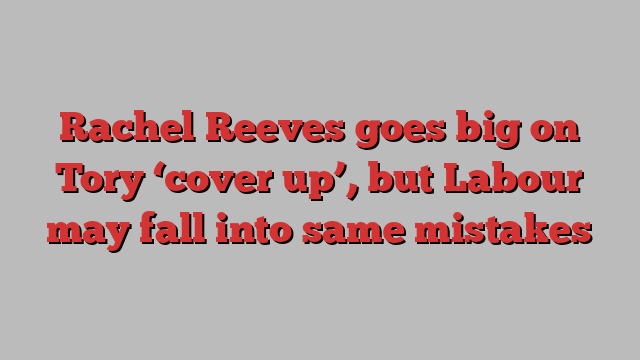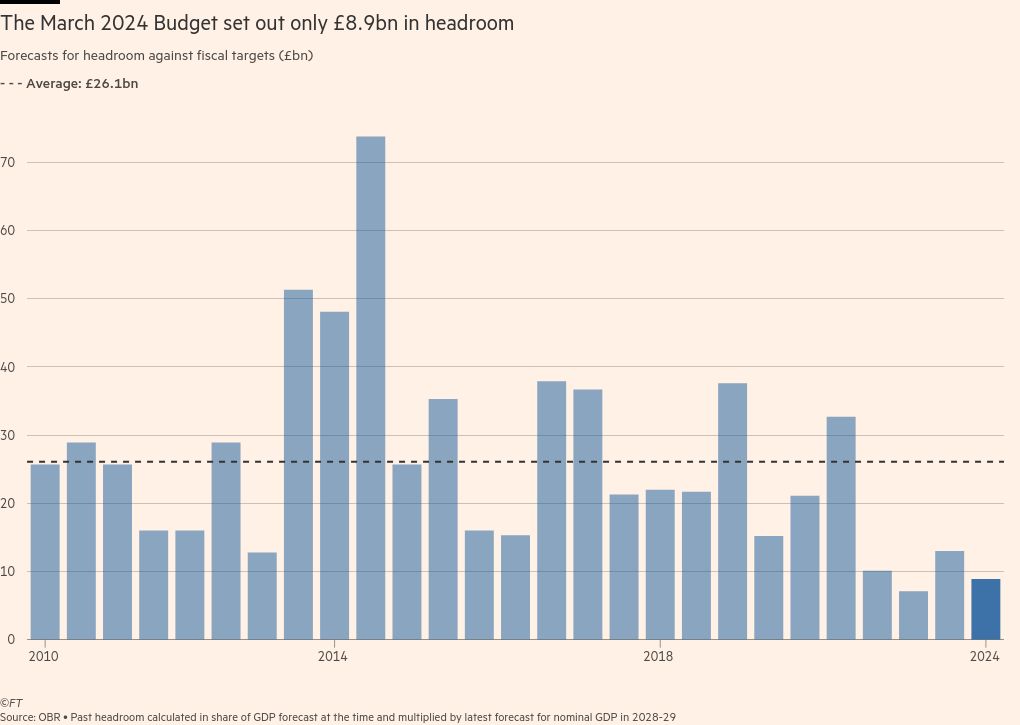
This article is an onsite version of our Inside Politics newsletter. Subscribers can sign up here to get the newsletter delivered every weekday. If you’re not a subscriber, you can still receive the newsletter free for 30 days
Good morning. Rachel Reeves’s big “there is a hole in my Budget” statement yesterday was the subject of much cynical commentary before the event, quite a lot of it from, uh, me.
We did already know, as I often wrote during the election campaign, that the Conservatives’ spending plans were essentially fictional. (Richard Hughes, the head of the Office for Budget Responsibility, went further, saying that it was “probably being generous” to describe the government’s departmental plans as a work of fiction.)
But what the new government’s audit appears to comprehensively show is that we really didn’t know the extent of the in-year pressures ignored by the outgoing Conservative government. In a coup for the chancellor, both the UK’s fiscal referees have affirmed her claims. The IFS’s Paul Johnson has said that “Rachel Reeves is within her rights to feel somewhat aggrieved”, while the OBR has launched a review into “the adequacy of the information and assurances provided to the OBR” by the previous government.
Politically, Reeves’s speech was already a bit of a sticky wicket for the Conservatives, who have been divided between two bad arguments. First, arguing that the gap in the public finances was already known runs into the problem that the UK’s current level of public services visibly doesn’t pass muster for most voters — and saying that the previous Tory government knew about overspends just punches the bruise. And arguing that the Conservatives left Labour with a good economic inheritance flies in the face of the UK’s poor economic performance since the financial crisis.
Unless the OBR’s review concludes that Labour had adequate information — which this morning appears unlikely — that rebuke by the UK’s fiscal watchdog is going to be a political wound that the next Tory leader will need to cauterise if they want to be successful.
But the good news for the Conservatives is that some of Reeves’s response to her inheritance bears a strong resemblance to the mistakes the Tories made in office.
So it is possible that the decisions she made towards plugging the £22bn shortfall yesterday, and at her first Budget on October 30 could speed up the Tory party’s return to power. Some initial thoughts on that below, with more to follow throughout the rest of the week, the summer and indeed I imagine most days between now and the Budget.
Inside Politics is edited by Georgina Quach. Read the previous edition of the newsletter here. Please send gossip, thoughts and feedback to [email protected]
Heart in the hole
Rachel Reeves’s audit of the spending pressures facing the new government make a pretty comprehensive case that the £20bn Jeremy Hunt spent reducing national insurance pre-election was, to put it mildly, unwise, but she’s going to keep the NI cuts.

In a nutshell, that’s the biggest political gamble that Reeves has made thus far. She has weighed the electoral cost of using these greater-than-expected spending pressures to abandon her pledge on national insurance, and is betting that this is bigger than the cost of means testing the winter fuel allowance for pensioners, cancelling a swath of infrastructure projects, finding more novel ways to raise revenue, and overseeing tighter spending rounds for the foreseeable future.
Not all of these policies are created equal — the winter fuel allowance was created at a time when the state pension was significantly smaller than it is now. So this makes sense, as the triple lock gradually increases the generosity of the state pension, for measures designed to top it up to become means-tested and where appropriate, fall away entirely.
Reeves also became the latest chancellor to abandon plans to put a cap on social care costs. The failure to grip this issue and fix the country’s social problem has knock-on consequences for the NHS, and improving the condition of the health service is the single biggest thing that people expect from the Labour government. In both policy and political terms this move is fraught with risk.
Punting off difficult decisions about social care has become a new British political tradition in recent decades. Another older one is that, when the going gets tough, the chancellor of the exchequer cuts infrastructure spending. (Indeed, we have seen the chancellor reach for this when the going is easy, too.) Doing so is bad for the UK’s growth prospects, and bad, too, for Labour’s hopes of getting out of the country’s doom loop of sluggish growth and insufficient cash for struggling public services.
Ruling out increases in national insurance and income tax (in addition to increases in value added tax and corporation tax) not only means putting aside the biggest revenue raisers the government has. It means relying on taxes that run a bigger risk of harming Labour’s plans to get the UK building again, and ones that may be more unpopular and cause bigger rows than reversing a tax cut that did nothing to improve the Tory party’s fortunes. As the FT editorial board warns, Labour risks falling into the same trap as its Conservative predecessors: which may mean that even though the Tory party appears not to have a real answer to Labour’s attacks, the winner of this summer’s Conservative leadership election could yet end up in Downing Street.
Now try this
This week, I mostly listened to Dire Straits’ Brothers in Arms while writing my column. While the title track is deservedly adored, I think ‘So Far Away’ is my personal favourite.
Top stories today
Recommended newsletters for you
US Election Countdown — Money and politics in the race for the White House. Sign up here
FT Opinion — Insights and judgments from top commentators. Sign up here